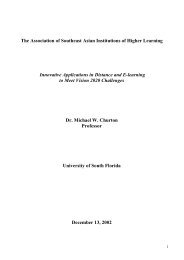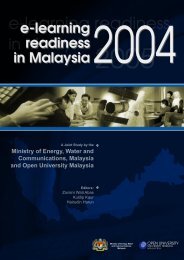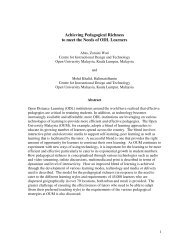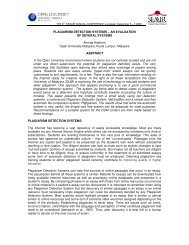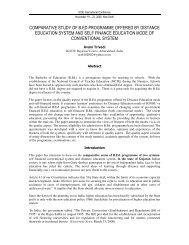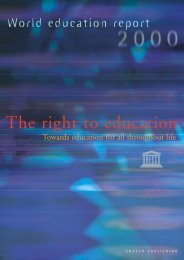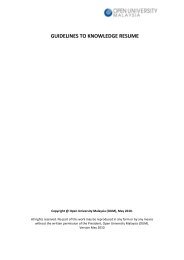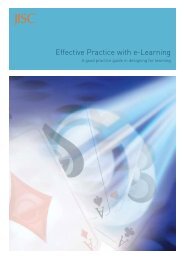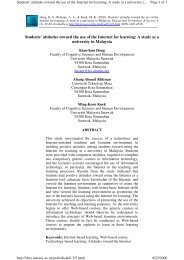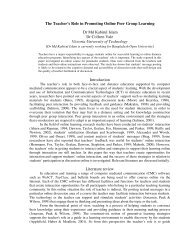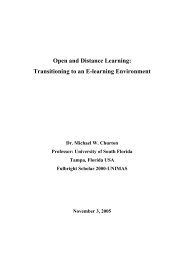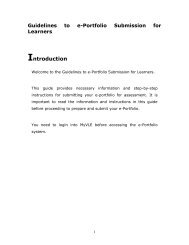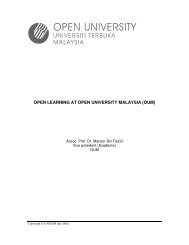lifelong learning and distance higher education - Asia Pacific Region
lifelong learning and distance higher education - Asia Pacific Region
lifelong learning and distance higher education - Asia Pacific Region
- No tags were found...
Create successful ePaper yourself
Turn your PDF publications into a flip-book with our unique Google optimized e-Paper software.
indicators currently being used for the accreditation of <strong>education</strong>al institutions <strong>and</strong>programmes. In this way it can play a useful role in elaborating performance indicatorsthat are used internationally for quality assurance <strong>and</strong> accreditation. In October 2002,UNESCO launched the Global Forum on International Quality Assurance, Accreditation<strong>and</strong> the Recognition of Diplomas, which aims to focus attention for issues relating toquality assurance, accreditation <strong>and</strong> international recognition on the agendas of the <strong>higher</strong><strong>education</strong> sector <strong>and</strong> national <strong>and</strong> international policy-makers. UNESCO pays specificattention to the issue of cross-border <strong>education</strong>.In 2004, in co-operation with OECD, UNESCO initiated a project on Guidelines forQuality Provision in Cross-border Higher Education, which aims to develop guidelines fornational stakeholders on how to provide quality cross-border <strong>education</strong>. Part of this projectis the establishment of an international information tool on recognised <strong>higher</strong> <strong>education</strong>institutions. This initiative has great potential in relation to international recognition, inoffering a solution to one of the main problems of recognition: cross-border provision.A final important international initiative is the International Network of QualityAssurance Agencies in Higher Education (INQAAHE). This network aims to gather <strong>and</strong>disseminate information on existing <strong>and</strong> forthcoming quality assurance methodologiesin <strong>higher</strong> <strong>education</strong> <strong>and</strong> promote best practices. It fulfils an important network function,as it provides a forum where quality assurance <strong>and</strong> accreditation organisations can meet.The network also fosters the use of credit transfer systems <strong>and</strong> encourages <strong>education</strong>alinstitutions to provide materials to facilitate the international recognition of diplomas. Inaddition, it intends to provide a warning system for dubious accreditation processes <strong>and</strong>organisations.DEVELOPMENTS IN THE NETHERLANDSIn 2002, in the early years of the Bologna process, the Netherl<strong>and</strong>s made the switch froma quality assurance system to an accreditation system. The accreditation system wasintroduced together with the Bachelors <strong>and</strong> Masters degree structure. It was not built fromscratch; the Netherl<strong>and</strong>s already had an elaborate system of quality assurance, which waseven imitated by other countries. The Dutch quality assurance system was managed bythe two umbrella organisations of universities <strong>and</strong> universities of professional <strong>education</strong>.The final statement was not an official recognition or accreditation decision but a qualityjudgment by visiting peers, formulated by the quality assurance agency in a final report.At the heart of the new system introduced in 2002 is the NVAO (Netherl<strong>and</strong>s-FlemishAccreditation Organization), which is responsible for accrediting existing programmes<strong>and</strong> assessing new programmes. If a programme receives accreditation, the institutionis entitled to award recognised diplomas <strong>and</strong> degrees for that programme for thecoming six years, <strong>and</strong> students may obtain a student grant/loan while enrolled in theprogramme. Furthermore, government-funded institutions receive funding in respect oftheir accredited study programmes. Providers of e-<strong>learning</strong> degree programmes can alsopose a request for accreditation provided that institution is situated in the Netherl<strong>and</strong>s.The NVAO applies the same st<strong>and</strong>ards for e-<strong>learning</strong> as for regular courses as these arebroad enough to relate to the specific requirements of this type of <strong>education</strong>. Till now,no e-<strong>learning</strong> courses have been accredited. Non-degree programmes do not qualify foraccreditation at present.The accredited programmes of government-approved or government-funded institutionsqualify for inclusion in the Central Register of Higher Education Programmes (CROHO).In addition, the NVAO administers its own register.125



